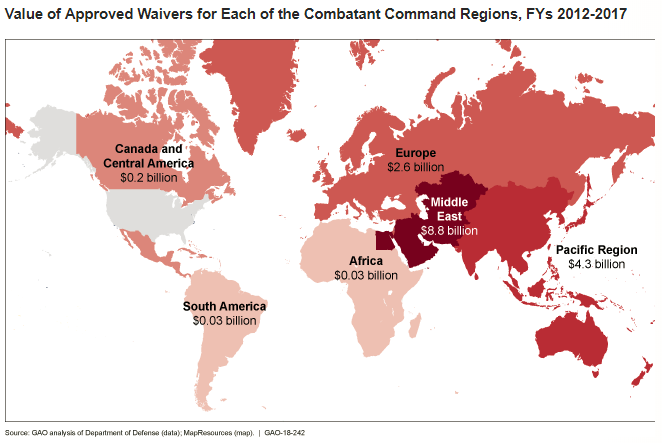When a foreign government purchases major weapon systems from the U.S., to the tune of tens of billions a year, the Department of Defense is supposed to impose additional charges to help recoup the significant U.S. investment in research and development and the like.
But increasingly, the U.S. is backing down from that demand and waiving the additional fees in order to ease the sticker shock and ensure sales -- a fearful concession that cost American taxpayers $16 billion over the past five years and nearly $6 billion in fiscal year 2017 alone, according to a new government report. The biggest beneficiary? The Middle East.
"[Defense Security Cooperation Agency] officials stated that avoiding a potential lost sale is paramount and outweighs the benefits of collecting nonrecurring costs, which may only be a small fraction of the overall sale," says a report published Wednesday by the Government Accountability Office. "DSCA officials added that if a waiver request is not approved, U.S. relations with the foreign government could become strained or otherwise be negatively affected."
Sometimes the U.S. waives the fees for close allies, like NATO nations, because the new equipment is necessary to ensure operational compatibility. But more often than not, the fees are waived due to a concern over "loss of sale" to nations around the world, GAO said.
A map created by the Government Accountability Office shows that Middle Eastern customers have received the most valuable breaks, nearly nine billion dollars-worth since 2012. The Pacific Region, including China, is next up, having saved some $4.3 billion. Europe, including Russia, got $2.6 billion in breaks.
The GAO found that the DSCA virtually never declines a waiver request: From FY2012 to FY2017, the agency reviewed 813 waivers and rejected three.
Primary Source: GAO Report (PDF)
[Do you have a tip or question for Code and Dagger? Reach us at CodeAndDagger@protonmail.com. And if you like what you read and want to help keep the site running (kind of) smoothly, click here to learn how you can support the site. ]













